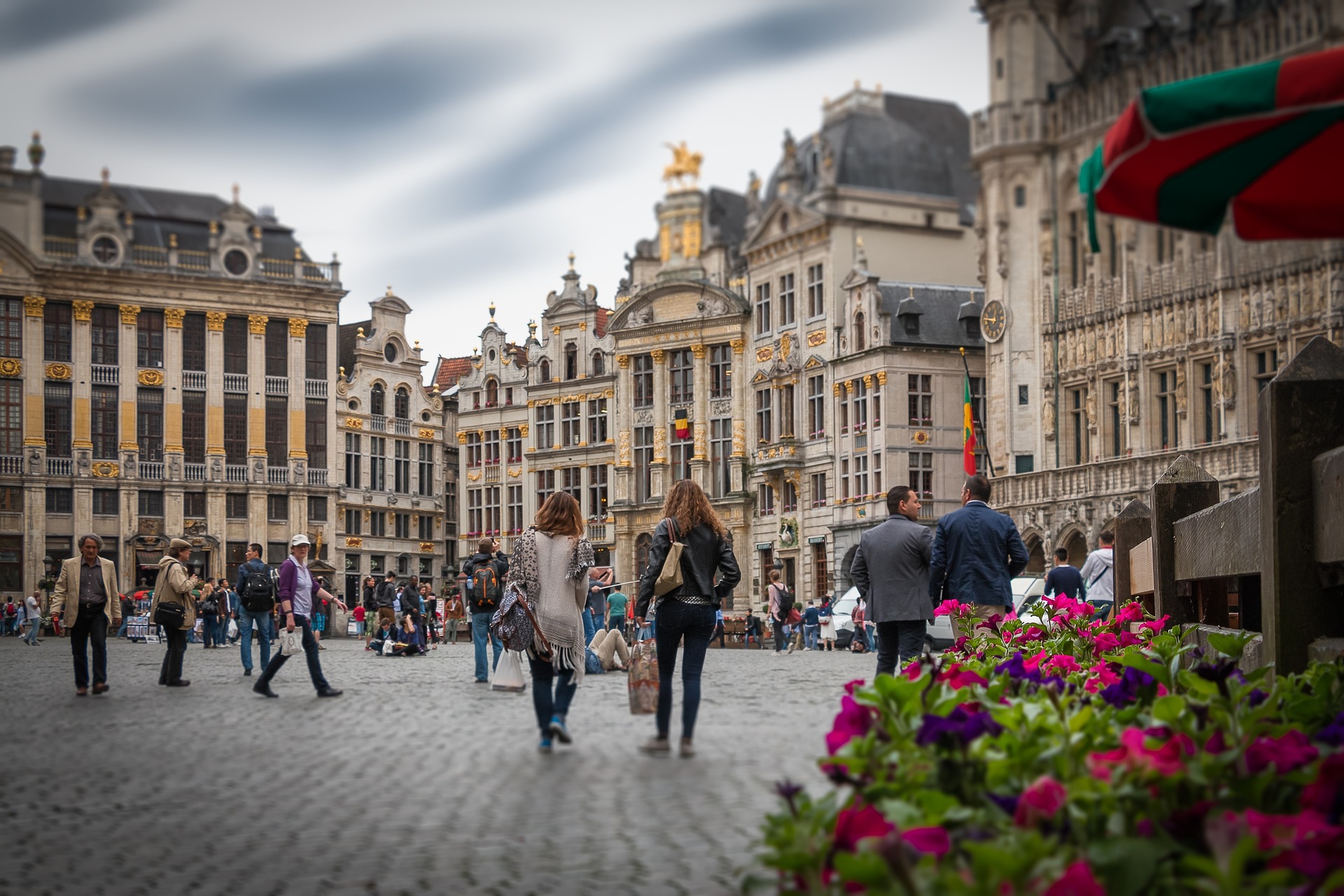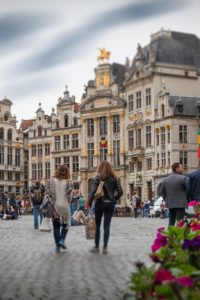
View of Brussels
I must apologise for the delay in continuing with this series. To quote Rabbie Burns, and as today’s post shows, “The best-laid schemes o' mice an' men/Gang aft a-gley.”
At the end of 1814, we left the exiled Napoleon on Elba. Across the Atlantic, on January 8th 1815, American forces defeated the British in the Battle of New Orleans, the last major battle of the War of 1812. On January 21st, the mortal remains of the guillotined Marie Antoinette and Louis XVI were transferred in a sombre procession to the royal crypt in Saint-Denis. The restoration was complete. The map of Europe could be re-drawn again and the victorious allies agreed to meet in Vienna to discuss the new borders.
Meanwhile, thousands of Britons had decamped for the Continent. Their reasons were mixed; some simply wished to travel again while others hoped to leave their massive debts behind and live abroad on an ‘economical plan’. They soon established their own enclaves in Brussels and Paris where they continued to live the same life as they had at home, mixing with the same people and founding such bulwarks of English society as clubs and libraries where they could be sure to remain among themselves.
At the beginning of March, with trade with the European continent open again, Britain’s ruling classes looked to protect the interests of the landowners by introducing the Importation Bill. This was the first of the so-called Corn Laws, designed to prevent the importation of cheap foreign grain, thus keeping their incomes at war-time levels. They happily ignored the fact that as a result, the price of bread would be at an artificially high level, a fact that did not escape the poorer classes. In the ensuing riots, the windows of White’s club were broken and parliament had to be surrounded by a protective cordon of soldiers.
All rioting ceased when the news reached England that Napoleon had escaped from Elba and was marching towards Paris. He had indeed returned with the violets. The Importation Bill became law without further ado and Europe awaited the next developments with bated breath. A contemporary source summarised Napoleon’s progress as follows:
A Conversation between Two Gendarmes, modelled on THE TIMES:
First Gendarme: What is the news?
Second Gendarme: Ma foi! the news is short.
The tiger has broken out of his den.
The Monster was three days at sea
The Wretch has landed at Frejus
The Brigand has arrived at Grenoble
The Invader has entered Lyons
Napoleon slept last night at Fontainbleu
The Emperor enters the Thuilleries this day.
On March 19th, Louis XVIII and his family hurried away from the Tuilleries, only some hours before the Emperor’s triumphant return. The English who had flocked to Paris now as hastily left it, many heading for Brussels.

The allies, happily ensconced in Vienna, were caught wrong-footed. Armies recently dismissed were hastily recalled and on April 5th the Duke of Wellington arrived in Brussels to take command, initially of the British forces but soon, as Commander-in-Chief, also of the army of the United Netherlands. Enriched and enlivened by the influx of officers, the Brussels social whirl continued alongside the preparations for war. Would Napoleon sally across the French border to attack the allied forces or would he remain in France, daring them to invade?
The Duchess of Richmond appealed to Wellington himself for advice as to whether her ball, planned for June 15th, might go ahead. “Duchess, you may give your ball with the greatest safety, without fear of interruptions” was his reply.
Byron captures best what happened next:
There was a sound of revelry by night,
And Belgium's capital had gathered then
Her beauty and her chivalry, and bright
The lamps shone o'er fair women and brave men;
A thousand hearts beat happily; and when
Music arose with its voluptuous swell,
Soft eyes looked love to eyes which spake again,
And all went merry as a marriage-bell;
But hush! hark! a deep sound strikes like a rising knell!
Did ye not hear it?–No; 'twas but the wind,
Or the car rattling o'er the stony street;
On with the dance! let joy be unconfined;
No sleep till morn, when Youth and Pleasure meet
To chase the glowing Hours with flying feet.
But hark! that heavy sound breaks in once more,
As if the clouds its echo would repeat;
And nearer, clearer, deadlier than before!
Arm! arm! it is–it is–the cannon's opening roar
Napoleon had ‘humbugged’ him, as Wellington admitted to the Duke of Richmond, sending Ney to attack the British and Dutch-Belgian forces at Quatre Bras while he himself forced the Prussians to retreat at Ligny. But even as the wounded from these encounters were brought to Brussels, the Allied and French armies marched towards Waterloo, a small village south of Brussels on the far side from Brussels of the Forest of Soigné.

Overnight, regiments assembled on the Place Royale before marching out of Brussels, past the long procession of farm carts coming to market as usual. As one observer put it, After the army was gone, Brussels indeed seemed a perfect desert. Every countenance was marked with anxiety or melancholy—every heart was filled with anxious expectations….At about three o’clock [on the 16th], a furious cannonading was heard.
From then until the evening of the 18th, the residents of Brussels were torn between the hope of victory and fear of defeat. Some fled immediately towards Antwerp while others remained but prepared for instant flight. One after the other, the dreadful reports arrived: The Prussians had retreated, the Highland regiments that had been piped out of Brussels only that morning had been slaughtered, Wellington had been defeated; the French were at the gates…Every hour only served to add to the dismay.
On the night of the 17th, a violent thunderstorm came on, followed by torrents of rain which during the night, when the army were laying unsheltered upon the field of Waterloo, never ceased a single moment. On Sunday [the 18th] the terror and confusion [in Brussels] reached its highest point.
Meanwhile, on the plain of Waterloo, Wellington and Napoleon set out their armies as calmly as a grandmaster might dispose of his chessmen were he allowed a free hand in their positioning. It was mid-morning before the battle commenced, perhaps because the ground was too wet to allow the artillery to move its guns. But soon about two hundred thousand men were engaged in deadly combat. The battle waged all day until, near sunset, the invincible Imperial Guard was forced to retreat causing the surviving French to flee. The battle was over, the allies under Wellington had won the day, Napoleon was finally defeated, but at what cost?

The story of the battle is too well known for me to go into it in depth here. I have done this in my novel, The Murmur of Masks. For now, let us leave the last word to Byron.
The earth is cover’d thick with other clay,
Which her own clay shall cover, heap’d and pent,
Rider and horse,—friend, foe,—in one red burial blent!
The Regency Decade: 1815 Part One: Waterloo Description:
The Murmur of Masks
Anything Can Happen at a Masquerade – Just Ask Olivia
Eighteen-year-old Olivia’s naval captain father is ‘somewhere at sea’ fighting the French when her mother dies suddenly, leaving her daughter homeless. Desperately in need of security and safety, a distraught Olivia accepts Jack Rembleton’s offer of a marriage of convenience, hoping that love will grow between them. She does not know that Jack’s affections are elsewhere engaged.
Introduced into society by the young Duchess of Gracechurch, Olivia meets Luke Fitzmaurice who is instantly smitten. She is forced to recognise that she has renounced the joys of girlhood without ever having experienced them.
Ten years later, Olivia has made the best of her situation. She loves her children and has found her place in the ton. An unexpected encounter at a masquerade with Luke Fitzmaurice leads to a second chance at love. Dare she grasp it? Before she can decide, Napoleon escapes from Elba and Luke joins Wellington’s army in Brussels. Will war once again dash Olivia’s hopes of happiness?



